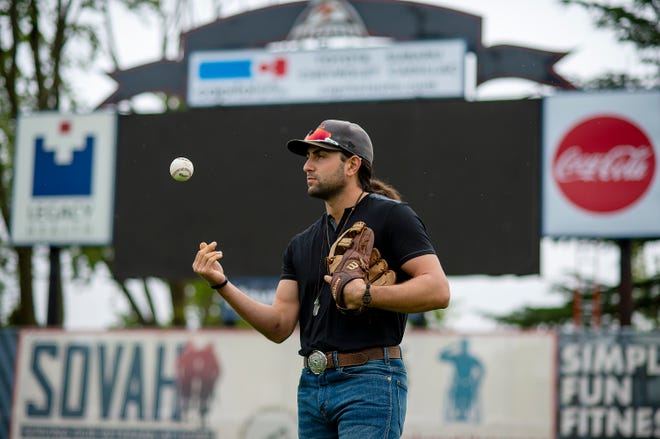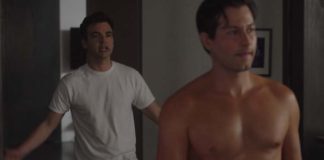Bryan Ruby first started to realize he was different at 14 years old. That’s when the hiding began. Along with the darkness.
He found emotional refuge in two different parts of his identity. He’s a professional baseball player, a member of the Salem-Keizer Volcanoes, which makes him much closer to a journeyman than a major-leaguer. And he’s a country music songwriter, having written two songs that reached the charts, plus countless ballads in his notebook.
Yet it’s Ruby’s hidden part of his identity that he now believes can have the biggest impact, partially because it’s so foreign to the worlds of baseball and country music.
Ruby is a gay man, the only active professional baseball player at any level to be publicly out.
“I kept thinking about the little 14-year-old me, who was scared because I’m a baseball player who loved country music,” Ruby, 25, told USA TODAY Sports. “Those are worlds where people like me are told they can’t belong. I’m not a hot-shot prospect. But today, you can’t find a single active baseball player who is out publicly. I want to help create a world where future generations of baseball players don’t have to sacrifice authenticity or who they really are to play the game they love.”
His coming out follows a summer in which Las Vegas Raiders defensive end Carl Nassib and Nashville Predators prospect Luke Prokop also came out as gay. After years of no actively out players in men’s professional sports, now there are three.
Playing the guitar in his bedroom in recent months, with posters of Dierks Bentley and Cal Ripken Jr. hanging in the background, Ruby sang a song he’s co-written that seems especially relevant given his purpose behind coming out.
“If that white line ever gets lonely, if the nights get a little too cold, if it don’t work out, if you have your doubts, you’ve got a place to go.”
Ruby’s goal is clear: to help others who are forced to hide their identity, too.
“Being closeted for basically 10 years, it was a struggle the whole time,” he said. “I used to hate myself. Hate how I felt. I’d ask why am I feeling this way?”
“I kept having people tell me, ‘Be very cautious of who you tell’ or ‘They don’t need to know your personal life.’ The best way to describe the hiding as an athlete is like you’re running with a weighted vest on,” he said. “It’s on all day and you can’t take it off. I’ve been gradually taking that weight off.”
Factor in Ruby’s second career in Nashville – where he moonlights writing hits for HaydenJoseph and Xavier Joseph – and you’ve got two worlds that scream he’s straight.
“As a country music songwriter, at first I thought being gay was a huge weakness,” said Ruby, who will be showcased in the upcoming documentary, “Out in Nashville.” “There’s this genre about drinking beer and hooking up with girls in the back of the truck. Then I realized that I can bring something different to the table. Love songs don’t need to be gay or straight. And I’ve been able to write my best songs by being authentic.”
Ruby told his family and close friends he was gay four years ago, then his teammates this summer. But being out to the world publicly was the last step.
Ruby pauses: “But I don’t like the connotation to, ‘coming out.’ Because it’s more like ‘inviting in.’ “
A supportive family, ‘such courage’
Ruby trembled over the phone sitting parked in his black Dodge Ram truck with the wind blowing in the background.
“Mom, it’s me … I got a spot.”
Tears flowed down his cheeks as he told his family in March that he made the Volcanoes roster.
A year ago, the future was uncertain for Ruby and the Volcanoes. A Class-A affiliate of the San Francisco Giants from 1997 to 2020, the Volcanoes were not one of the teams invited to join Major League Baseball’s newly created minor league structure. They eventually formed the Mavericks Independent League with three other teams based in the Salem, Oregon area.
Meanwhile, Ruby did not play last year, along with hundreds of other farmhands when minor league seasons at all levels were canceled because of COVD-19.

“I didn’t think I’d ever play (pro) baseball again,” said Ruby, who has kept his career going internationally in six countries that include Austria, Chile, Germany, Guatemala, Peru, and Switzerland – all after a standout career at Vassar College. “I told myself I’d go to the end of the earth if it meant I could keep my baseball career alive. …I’ve been a baseball player since I was seven or eight, way before I knew I was gay. It’s the lens through which I see the world.”
Ruby’s mother, Lauren, remembers her son’s Little League days – a childhood he said he couldn’t have scripted more perfect. But as puberty hit and his friends were growing more attracted to girls, he started to isolate and develop self-hatred at his feelings for guys.
“When Bryan told me he was gay I was shocked actually,” Lauren Ruby said of the revelation when Bryan was 21. “I didn’t see it coming. Mostly because Bryan did a really good job of hiding it. I took several weeks of needing to change my reality from my fantasy of what I thought Bryan’s life was going to be. It was heartbreaking to know he was suffering for so long. I was scared for him because people can be so close-minded and hateful. And the male sports world can be very homophobic with degrading banter. I wanted to protect him from all of that.”
Bryan was terrified to tell his father, Jon, a star high school quarterback who also played Division I baseball. “I shocked my Mom, but my Dad shocked me because he sort of suspected it,” Bryan said. “Then he sort of helped my Mom come along.”

“When your son sits there and bares his soul,” Jon Ruby said, “you just want him to be happy, and it hits you: what do you want for your kids? To go out into the world and be the best version of themselves. He has so much to offer the world with baseball and music. And he has such conviction …”
“Such courage,” his mother gently interrupts.
“I grew up in a culture where homosexuality was taboo,” Jon, a baseball coach at Friends’ Central High School in Philadelphia, said. “I had an unusual look into that culture, though, because my brother’s gay. He came out to me when he was 22, and it changed my whole perspective. All of the sudden, the (gay) slurs that I was hearing resonated much differently. It heightened my awareness.”
That same type of familial coincidence happened to Ruby when he was in the process of coming out to his teammates this year.
Gabriel Cotto, the Volcanoes’ catcher, said he never would’ve pictured Ruby as gay. But Cotto immediately embraced Ruby once he told him because his own father is gay.
“I grew up with two Dads and we were just like a regular family,” Cotto said. “But I used to get bullied and in fights growing up because my pops is gay. When Ruby told me, I just had so much respect for him. It made our friendship closer.”
Why ‘voices matter’
Ruby wears his lucky shoes in just about every game. They’ve got rainbow shoelaces in them now. He got the cleats from his mentor and friend, Billy Bean, the MLB vice president and special assistant to the commissioner.
Bean played in the major leagues as an outfielder for nearly a decade and came out as gay himself after his retirement in the 1990s. Despite a paucity of publicly out active players – Milwaukee Brewers minor leaguer David Denson came out in 2015 and retired shortly thereafter – Bean has been a visible presence and confidant for closeted MLB players.
Ruby wrote Bean a letter in 2018, and Ruby still has Bean’s response letter framed on his wall.
“I didn’t even put my last name or address,” said Ruby. “He’s someone who sits right next to the MLB commissioner and he has my back. I’ve worn his cleats everywhere I’ve played – on three different continents. I look down at them, and know I have support.
“I didn’t think about the symbolic meaning until recently, of me wearing his shoes and what I’m doing (going public).”
“The beauty of it for Bryan is that he’s not playing to only become a big leaguer,” Bean told USA TODAY Sports. “He’s playing because he loves the game. I imagine he’ll be proud of himself when he’s 40 years old in his country music career knowing what he’s doing for baseball. I couldn’t be prouder, and I definitely think Bryan’s story is a stepping stone in the right direction.”
A stepping stone that could have a domino effect for other gay professional athletes. Bean said that the decision of a closeted player to come out or not is “not as simple as people want to make it. There are so many considerations.”
Ruby ran the gamut in those considerations before telling his team.
“You must do well with the ladies, huh, man?” The questions in the locker room were aplenty. His typical answer: “I’m in a relationship.” True, but the answer evaded the discomfort of revealing his relationship with his boyfriend, Max, of a year and a half.
“It’s not all super rosy,” Ruby said.
Older coaches from past generations have been subtly homophobic, urging him to keep his sexual orientation a secret or to be with a woman to keep up a front. Teammates over the years have slipped out gay slurs. And opponents can be the worst of them all, shooting out sexual barbs to intimidate.
Gehrig Richins, the Volcanoes’ assistant coach, said he imagines teammates being protective of Ruby if gay slurs were to persist once he’s out publicly. “It’s almost better if we know as a team,” Richins said. “Because then there’s a sense of respect and guys can watch their language to avoid harm. We can have his back.”
But therein is part of the paradox of being closeted: Homophobic language begets fear. Then fear keeps athletes closeted and, in turn, teammates aren’t as likely to check their offensive language at the door.
“Bryan understands that until there’s more people like him or Carl Nassib (out), voices matter,” Bean said. “The expectation would be to mute your life off the field and hide. Putting yourself in discomfort to make others comfortable. But we embrace Clayton Kershaw’s family since it shows us he’s human.”
Ruby called Nassib and Prokop “heroes” and said he even bought his first-ever NFL jersey the day after Nassib came out.
“Each time somebody comes out in industries where queer people have not been historically represented in the mainstream,” Ruby said, “it helps to crumble the myth that you can’t be yourself. But we’re in the 2020s. It’s about damn time for this.
“If I can help just one person from this, then that’s greater than any single hit or home run or win that I ever get on the field.”








